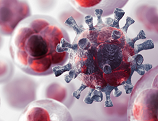Virus News: Swedish Study Shows That Highly Activated Anti-Bacterial T Cells Called MAIT Cells Linked To Severe COVID-19
Source: Virus News Sep 29, 2020 5 years, 4 months, 4 weeks, 1 day, 2 hours, 52 minutes ago
Virus News: Swedish researchers from the Karolinska Institutet in a new study claim that a type of anti-bacterial T cells known as MAIT cells, are strongly activated in individuals with moderate to severe COVID-19 disease.

The new research findings contribute to increased understanding about how the complex human host immune system responds against COVID-19 infection.
Severe COVID-19 is characterized by excessive inflammation of the lower airways. According to the researchers, the balance of protective versus pathological immune responses in COVID-19 is incompletely understood.
Mucosa-associated invariant T (MAIT) cells are antimicrobial T cells that recognize bacterial and MR1-presented riboflavin metabolites, and can also function as innate-like sensors and mediators of antiviral responses.
The study team investigated the MAIT cell compartment in COVID-19 patients with moderate and severe disease, as well as in convalescence. It was discovered that there was profound and preferential decline in MAIT cells in the circulation of patients with active disease paired with strong activation.
Transcriptomic analyses indicated significant MAIT cell enrichment and pro-inflammatory IL-17A bias in the airways. Unsupervised analysis identified MAIT cell CD69high and CXCR3low immunotypes associated with poor clinical outcome.
The study findings were published in the journal: Science Immunology.
https://immunology.sciencemag.org/content/5/51/eabe1670
Corresponding author, Dr Johan Sandberg, Professor at the Department of Medicine, Huddinge, at Karolinska Institutet told Thailand Medical News, "To find potential treatments against COVID-19, it is important to understand in detail how our immune system reacts and, in some cases, perhaps contribute to worsening the disease."
The T cells are a type of white blood cells that are specialized in recognizing infected cells, and are an essential part of the immune system.
Approximately 1 to 5 percent of T cells in the blood of healthy individuals consists of so-called MAIT cells, which are primarily important for controlling bacteria but can also be recruited by the immune system to fight some viral infections.
The study team in this research wanted to find out what role MAIT cells play in COVID-19 disease pathogenesis.
The study team examined the presence and character of MAIT cells in blood samples from 24 patients admitted to Karolinska University Hospital with moderate to severe COVID-19 disease and compared these with blood samples from 14 healthy controls and 45 individuals who had recovered from COVID-19. Four of the patients died in the hospital.
The study results showed that the number of MAIT cells in the blood declined sharply in patients with moderate or severe COVID-19 and that the remaining cells in circulation are highly activated, which suggests these MAIT cells are engaged in the immune response against SARS-CoV-2.
Interestingly, this pattern of reduced number and activation i
n the blood is stronger for MAIT cells than for other T cells.
The study team also noted that pro-inflammatory MAIT cells accumulated in the airways of COVID-19 patients to a larger degree than in healthy individuals.
Dr Sandberg added, "Taken together, these analyses indicate that the reduced number of MAIT cells in the blood of COVID-19 patients is at least partly due increased accumulation in the airways."
It was observed that in convalescent patients, the number of MAIT cells in the blood recovered at least partially in the weeks after disease, which can be important for managing bacterial infections in individuals who have had COVID-19, according to the researchers.
However in the patients who died, the study team noted that the MAIT cells tended to be extremely activated with lower expression of the receptor CXCR3 than in those who survived.
The study findings also presents evidence for a multifaceted role of MAIT cells in COVID-19 disease. This role is distinct from that of adaptive conventional T cells, as MAIT cells do not recognize HLA-presented peptide antigens. Their antiviral function is therefore probably innate-like and intrinsically less effective than the MHC-restricted CD8 T cell response on a per cell basis. On the other hand, MAIT cells are available to respond rapidly in large numbers without clonal expansion, and one may speculate that their antiviral effect could be significant in early infection.
Furthermore, MAIT cells have been shown in murine models to have a role in recruiting adaptive T cells to the lung. The findings of the study opens the possibility that the rapid and pro-inflammatory MAIT cell response may also play a role in the pathological inflammation of COVID-19.
https://rupress.org/jem/article/213/12/2793/42060/MAIT-cells-promote-inflammatory-monocyte
Dr Sandberg commented, "The results of our research show that the MAIT cells are highly engaged in the immunological response against COVID-19. A likely interpretation is that the characteristics of MAIT cells make them engaged early on in both the systemic immune response and in the local immune response in the airways to which they are recruited from the blood by inflammatory signals.”
He further added, “There in the airways, they are likely to contribute to the fast, innate immune response against the SARS-CoV-2 coronavirus. In some individuals with COVID-19, the activation of MAIT cells becomes excessive and this correlates with severe disease."
These findings indicate that MAIT cells are engaged in the immune response against SARS-CoV-2 and suggest their possible involvement in COVID-19 immunopathogenesis.
For more
Virus News, keep on logging to Thailand Medical News.
